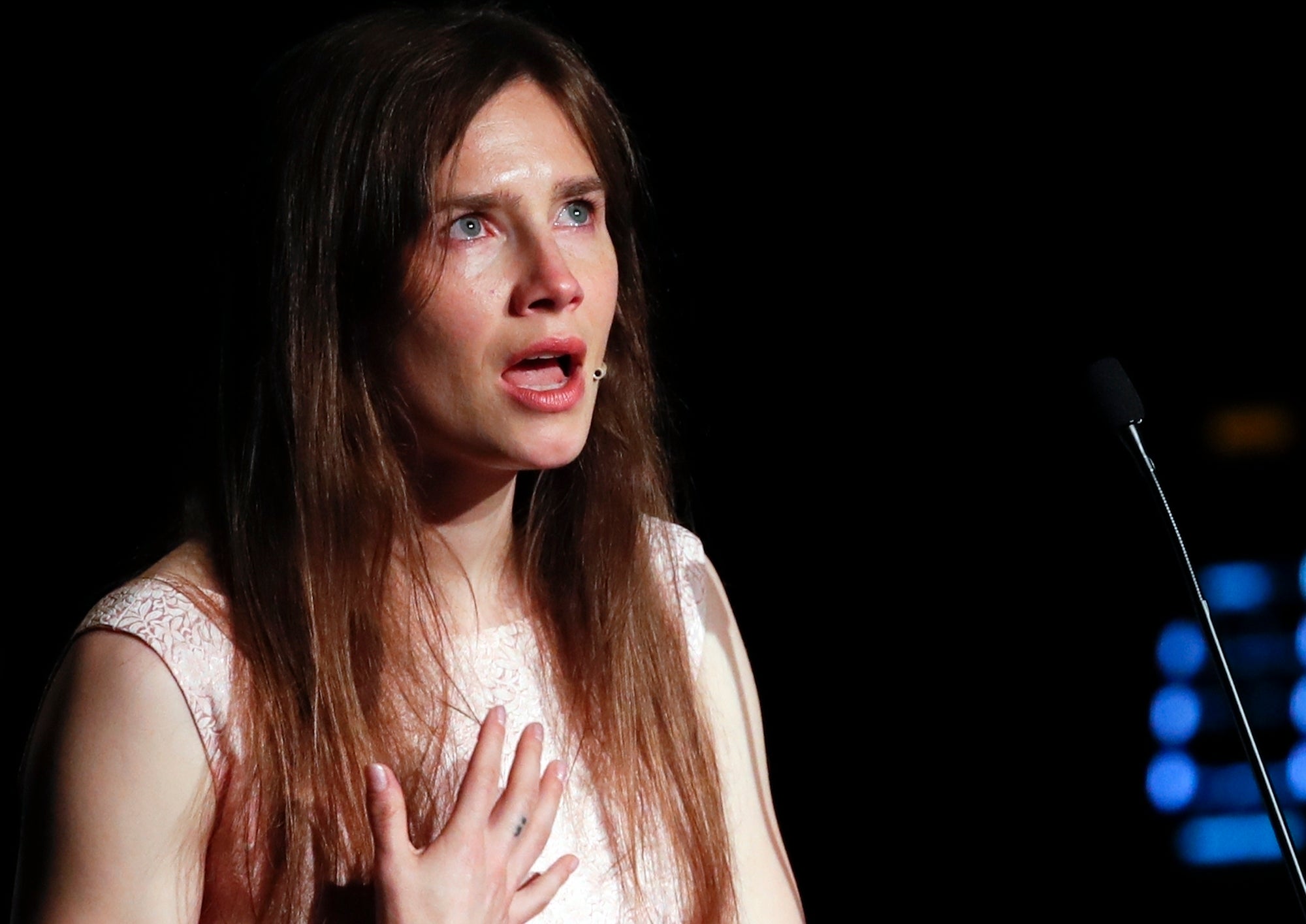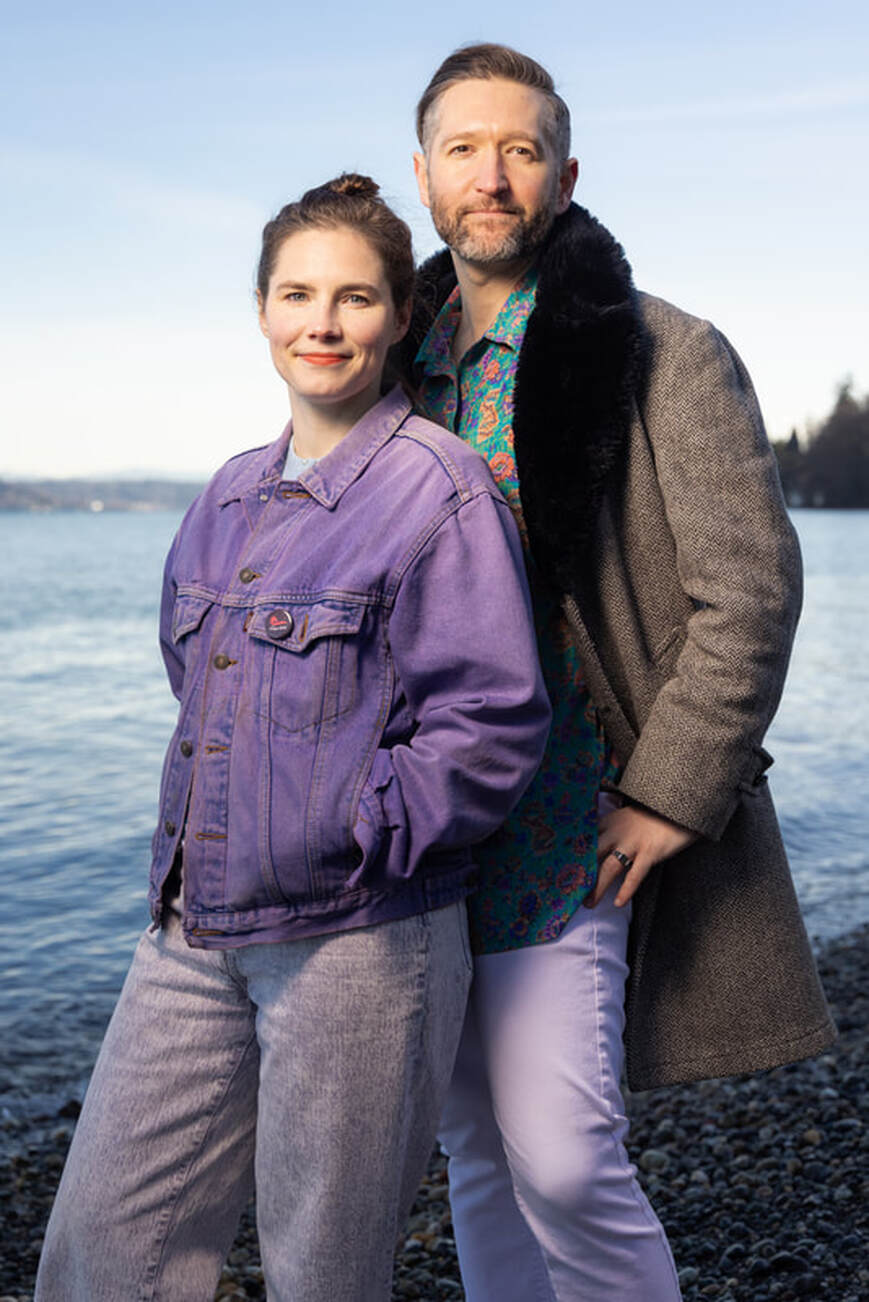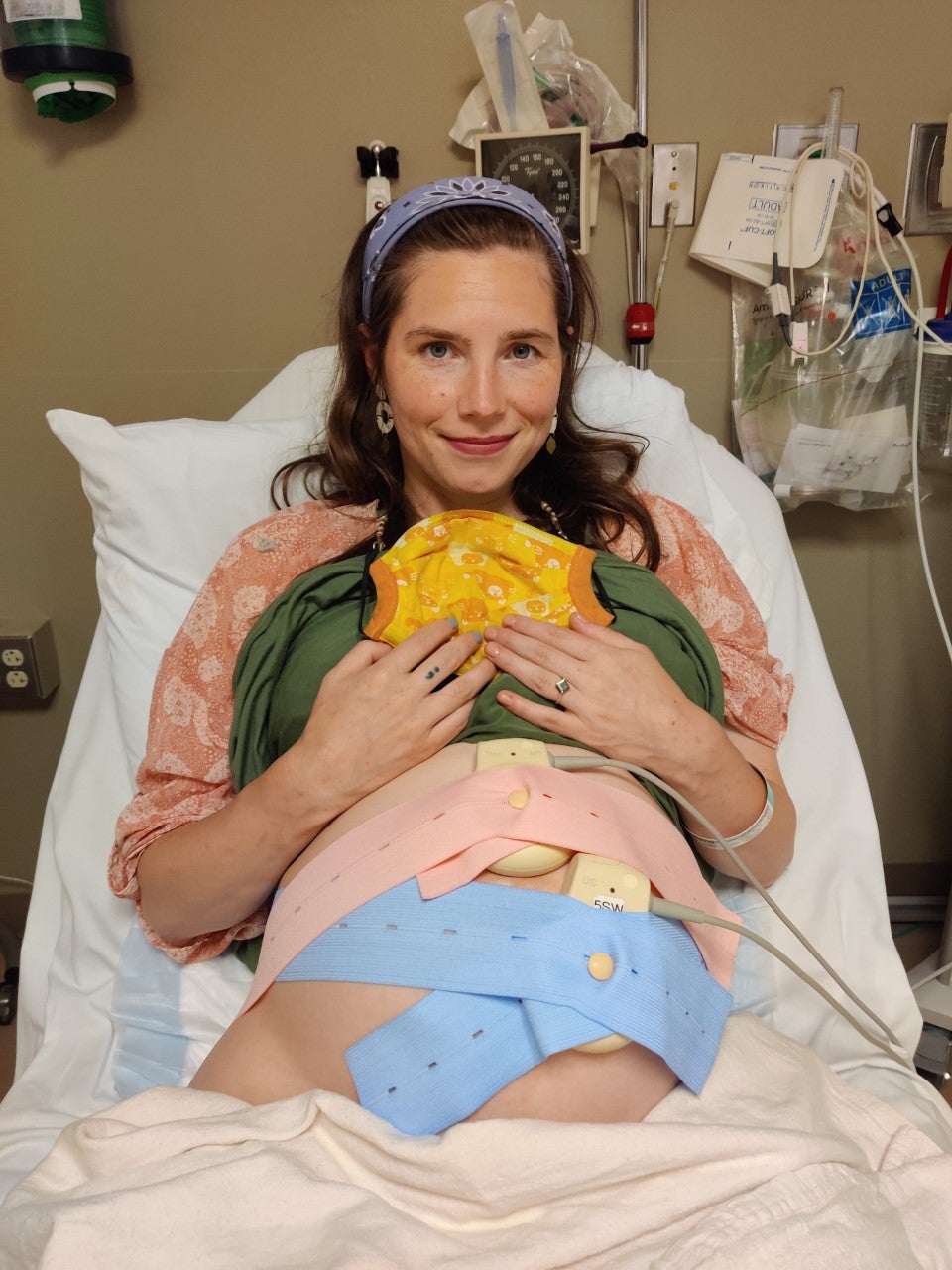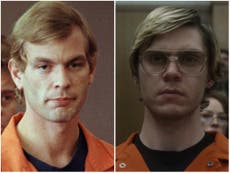Amanda Knox: Netflix’s Jeffrey Dahmer series is everything that’s wrong with true crime
Now a mother, author, podcast host, criminal justice reform advocate and “glorified karaoke singer,” Amanda Knox tells Bevan Hurley she’s trying to do true crime the right way.


Your support helps us to tell the story
From reproductive rights to climate change to Big Tech, The Independent is on the ground when the story is developing. Whether it's investigating the financials of Elon Musk's pro-Trump PAC or producing our latest documentary, 'The A Word', which shines a light on the American women fighting for reproductive rights, we know how important it is to parse out the facts from the messaging.
At such a critical moment in US history, we need reporters on the ground. Your donation allows us to keep sending journalists to speak to both sides of the story.
The Independent is trusted by Americans across the entire political spectrum. And unlike many other quality news outlets, we choose not to lock Americans out of our reporting and analysis with paywalls. We believe quality journalism should be available to everyone, paid for by those who can afford it.
Your support makes all the difference.Amanda Knox knows all too well what it’s like to have your life story dramatised for profit.
Having seen countless articles, books and movies either exploit her own nightmarish experience, the 35-year-old says true crime is in need of a reboot.
“It’s a big deal for the worst story of your life, and one that ends up unfortunately defining a lot of people’s lives, to just be thrown out there without any kind of acknowledgement that it’s going to have an impact,” she said in an interview with The Independent last week.
The carefree 20-year-old who found herself cast as a sex-obsessed killer after the murder of her flatmate Meredith Kercher in Italy in 2007 is now a married mother-of-one, an author, podcast host and a passionate advocate for criminal justice reform.
Cradling her 15 month old daughter Eureka, Knox tells The Independent from her home in Seattle that in the seven years since her acquittal and exoneration she has been engaged in an ongoing fight to reclaim her identity from that tawdry tabloid creation.
The insatiable appetite for true crime has seen a flood of top-rating series that often glamourise the grisly nature of events, while becoming ratings blockbusters for networks and streaming services.
Netflix’s Monster: The Jeffrey Dahmer Story and NBC’s The Thing About Pam have been criticised for failing to consult or even notify family members depicted in the shows, retraumatising innocent people who find themselves thrust into that maelstrom.
“The most egregious thing that the Dahmer series did, that Hollywood does all the time, is it takes a big story that’s raunchy and ugly and raw, and puts it out there and portrays real human people without actually thinking about what the consequences to the victims could be,” Knox tells The Independent.
After the release of the Dahmer series in September, Rita Isbell, the sister of his 11th victim Errol Lindsey, wrote in Insider that she not had not even been informed that the show was being made.
The criticisms resonated with Knox, who last year called out actor Matt Damon and director Tom McCarthy for their film Stillwater, which told the story of a young American imprisoned abroad on murder charges.
In a July 2021 essay for The Atlantic, Knox wrote how the film was cashing in on her life story while perpetuating false assumptions of her own guilt.
“I can’t tell you the number of times that people have made versions of my story and have either explicitly named a character Amanda Knox, or have named it Jamanda Crocs,” Knox tells The Independent. “They only tell me that it’s ever happening at the very last minute, or I just happen to find out about it, along with the rest of the world. And it’s never given a second thought that taking this person’s story, which is recognisably a real human being and defining them. Even if you take all of these like fictional storytelling diversions, they’re still going to be reflective on the person that the audience is clearly thinking of when that person is being portrayed.”

She says Hollywood power brokers need to consider the bigger picture before commissioning their next true crime series.
“I think they need to take a step back and ask themselves, is there more to this than the bottom line? And is there a bigger purpose than that to this than just taking someone else’s worst experience of their life? And rehashing it again, for the sake of profit?” Knox said.
Trial by media
In 2007, Knox was an exchange student and part-time bar hostess living in Perugia, Italy, when her flatmate Meredith Kercher was found dead in her bedroom.
Her throat had been slit, knife wounds suggested she may have been tortured, and she had been sexually assaulted.
As media descended on Perugia from around the world, a daily drumbeat of salacious front page stories quickly formed an unflattering narrative around Knox brimming with misogyny.
Giuliano Mignini, a powerful local magistrate with a fixation on conspiracy theories involving satanic rituals, turned the investigation, quite literally, into a witch hunt.
Amid intense, and often vitriolic media coverage fuelled by leaks from prosecutors, Knox and her boyfriend Raffaele Sollecito were arrested for Kercher’s murder.
Knox would later recount how she was not provided a lawyer or an interpreter by police after her arrest, and would later tell how she was subjected to physical and verbal abuse.
Looking back, Knox sees a connection between the saga unfolding in Perugia and the explosion in popularity of social media -- particularly Facebook.

“At the time that I was going through my experience, it was very new for people to be so split online and to be living in these echo chambers, where they were really, taking extreme sides and not appreciating the nuances of what was really happening on the ground,” she says.
“That’s just the nature of the algorithm. And we saw that playing out in my case, before we started seeing it play out in things like politics.”
When local drifter and burglar Rudy Guede was arrested and charged with Kercher’s murder, the media focus only momentarily shifted away from Knox.
Guede implicated Knox and Sollecito in Kercher’s murder, and he was convicted and sentenced to 30 years prison after a fast-tracked trial. His shifting statements to police were never fully probed in court.
After almost two years in jail and an 11-month trial during which she was portrayed as a promiscuous “she-devil,” Knox was convicted of murder and sexual violence. Her family’s attorneys immediately appealed, citing faulty DNA evidence, a botched investigation and the overwhelmingly negative sentiment towards her in Italy.
After a court-ordered review of DNA evidence, she was acquitted in 2011 and returned to the US.
Then in 2013, Italy’s highest appeals court set aside the acquittal, and ordered a second trial. Knox was found guilty in absentia for a second time in 2014.
The verdict would be overturned in 2015, with a five-judge panel blaming prosecutor’s “glaring errors” and “investigative amnesia” in a damning denouement to Knox’s eight-year ordeal.
The best of true crime
Returning home to Seattle in 2011 with the appeals process still hanging over her, Knox tells The Independent she went through a phase of “trying to disappear and be an anonymous person”.
In 2013, she wrote a bestselling memoir Waiting To Be Heard, which helped pay off legal and PR bills, and the second mortgages her mother, father and grandmother had taken out to help pay for legal bills, she told the New York Times last year.
With $200,000 left over to start her new life, she finished an undergraduate degree in creative writing at the University of Washington and started writing columns under a pseudonym for a newspaper.
Finally emerging from her legal purgatory in 2015, Knox began writing articles and blogposts aimed at drawing attention to the underappreciated human costs of crime.
She was asked to host a true crime podcast by the Sundance Now network, and says she agreed on the condition that she could be brutally honest and critical of the genre’s shortcomings.

The project has since morphed into a new podcast titled Labyrinths, which Knox writes and produces with her husband Christopher Robinson. In it, she explores broader questions about how people wind up in the types of situations she’s found herself in.
Knox says she tries to humanise those who find themselves in the middle of a “true crime” experience so as not to portray them simply as monsters or victims. Her goal was to make people understand that those horrible experiences could happen to anyone, and broaden their empathetic perspective.
“True crime, at its best, is not just the exploitation of other people’s worst tragedies, it is a revealing of either institutional issues that need to be addressed or issues with human nature,” she tells The Independent.
“It’s really trying to bridge the gap between those of us who have had the unfortunate reality of our worst experiences becoming entertainment products, and the rest of us who feel like that would never ever happen to them.”
Knox added that, while “people identify with me as a true crime person, I do not identify as that.”
“That said, because I am now deeply invested in the criminal justice reform world, and I’m very close friends with a lot of people who are on all sides of the criminal justice world,” she said.
At a fundraiser in October for the Illinois Innocence Project, she was invited on stage as an honoree member of The Exonerees, a band of former inmates who collectively spent more than 100 years in prison for crimes they didn’t commit.
Knox, who describes herself as a “glorified karaoke singer”, sang I Will Survive and Nina Simone’s Feeling Good with repurposed lyrics to reflect the band’s experience of incarceration.
“They happened to stumble upon me, I think at karaoke at one time. And they were like, ‘Girl, you’re in the band’. They rope me in every once in a while to perform with them,” Knox shared of the group.

With her clear-eyed understanding of the inequities of the justice system, Knox believes the path to meaningful reform lies in placing the victims at the heart of the process.
“I think one of the big reasons why so many people have an eye for an eye mentality is because we don’t offer victims and victims family members much else in terms of acknowledgement of the severity of the crime,” she said.
She went on to say that reliance on punishment leads to overly harsh sentences that don’t reflect that person’s humanity.
“The criminal justice system, as it stands right now is really, really bad at acknowledging that for victims and giving victims the ability to rehabilitate after they have had something so drastic stolen from them or taken for them after they’ve been hurt so badly, the only thing we offer them is punishment for the perpetrator,” she continued. “Ultimately what a victim wants is acknowledgement, right? Like this whole thing happened. It was extreme, it was horrible, it never should have happened, we don’t want it to happen again.”
Knox understandably remains wary of speaking to the media, and having to continually relive the worst experience of her life. But with a young family and bills to pay, she has several projects in the works, including a film adaptation of her memoir, which will inevitably wind up in the true crime category.
She hopes that filmmakers, authors and journalists can try to keep the best parts of human nature in mind as a north star for how to tell a story.
“And to not give in to the impulse of just creating something to be outrageous and to grasp people's attention, for the sake of outrage, but to get into sort of warm your way into people's heart and at the same time educate them,” she said. “That's the best kind of true crime.”




Join our commenting forum
Join thought-provoking conversations, follow other Independent readers and see their replies
Comments